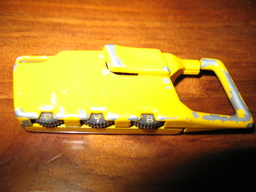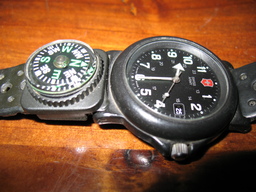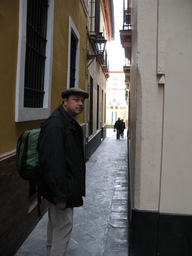You need less clothing than you might think. The way I travel I find it best to not bring too many changes of outfit, but to bring enough for a range of situations.
- 2 pairs of trousers
I actually know people who have traveled around the world wearing only one pair of trousers, just to lighten their load. I'm not that serious about saving room in my bag, myself. I take two pairs. Carrying only one item of any article of clothing would mean washing it by hand in the privacy of a hotel room every so often.
To many, two pairs of trousers might sound like they wouldn't be enough. I can honestly say that after six months on the road, having two pairs hasn't led to a single problem.
The only exception I would make for this two-trouser limitation is for women to substitute a dress, or men to substitute a pair or shorts--if shorts are acceptable wear in the region in which you plan to travel. That's substitute, not add.
- 1 sturdy pair of good-looking shoes
One of the easiest ways to free bag space up when traveling is to travel with only one pair of shoes. I remember how I used to over-pack my bags when I first began traveling, I was always bringing along an extra pair of shoes. I had all sorts of reasons for bringing two pairs: "What if the pair I'm wearing get soaked in some river and need to dry out?" "What if I get invited to dinner or some more formal function and want to have nicer looking shoes?"
I eventually realized that there really was no need for more than one pair of shoes. My fears about shoes getting too wet to wear never materialized. The answer to having presentable shoes for more formal situations was to buy one sturdy pair of good-looking shoes.
- 3-4 pair socks
- 3-4 pair underpants
- 3-4 short-sleeved shirts--either button-down or T-shirts
- 1 heavier, long-sleeved shirt
A long-sleeved shirt will be useful not just for chilly evenings, but also for wearing in more conservative countries where short-sleeved shorts are not worn in public.
- 1 coat which can be worn in the rain
- 1 pair of sweat pants
This pair of sweat pants can double as pajama bottoms as well as be worn as long underwear in cold weather.
- 1 belt
- 1 cap
It's best to have something which will protect from either sun or rain. This could just be any old baseball cap: it needn't be special or fancy.
- 1 towel
There are special travel towels that are extremely small. They're called "micro-fiber" or "super-absorbent". These towels are far smaller and lighter than a regular towel, yet can absorb as much water as a full-sized bath towel. They're a little bit expensive, but well worth it for longer trips when it's important to travel light.
- 1 or 2 pocket-sized packages of paper tissues
This is something I've learned to always keep on me when I travel. This is not out of some constant need for tissues. It's because when certain situations arise on the road, tissues are really needed: a bathroom without toilet paper, a sudden bloody nose on a long bus ride--tissues are a good thing to have handy in a pocket for unexpected circumstances.
- 1 basic first-aid kit
I do travel with a thorough medicine kit, though that's one of the least-used items in my bag. I would consider the essential items in that first-aid kit to be a small stack of bandages and a course of anti-diarrheal medication.
One tip which has helped me more than once: always keep one of those bandages outside your first-aid kit, tucked inside your wallet. If you should accidentally cut yourself while on the road, that's the exact time you won't want to be fishing through your bag, trying to dig your first-aid kit out.
My reason for considering anti-diarrheal medication the other essential item is the nature of life on the road. If you're stuck on a long-distance bus which takes many hours between cities, a sudden bout of diarrhea can feel like torture. Often, it takes time for stomachs to adjust to different standards of cleanliness or eating food in other regions.
I do have certain other items in my first-aid kit: tweezers, anti-biotic ointment, pain relievers, lip balm, and anti-fungal creams. However, I've been carrying these items in a little plastic box around the world for years. Most of the medications have expired without my having ever opened them. (I finally replaced everything, buying brand new tubes and bottles of everything that had expired at the beginning of this year.)
There is another item I carry in my first-aid kit which--while I seldom use--I highly recommend: mosquito repellant. It too, has mostly sat unused inside that plastic tub for over ten years, but I'll tell you--if you're somewhere remote, being bitten by lots of mosquitoes, you'll be thankful that you have it with you. I don't think I opened the bottle up in the first nine years I carried it, but was so glad I had it when I stopped at some mosquito-infested area in the middle of the night in rural Mongolia last year.
Of course, your kit should also include any essential or prescription medication which you regularly take.
- 1 pocket comb
- 1 pair of earplugs
- 1 sleeping mask
The earplugs and sleeping mask are in a similar vein to the mosquito repellent, but I'd say--rather than every few years--it's every couple of weeks that I am so happy I have these with me. These are the times when I arrive into a new city and the only hotel room available has a disco blaring under its window, or has some huge, flashing neon sign just outside. On other occasions, the earplugs and sleeping mask are good to block out loud movies or music played on long-distance buses. I carry both earplugs and sleeping mask in a little bag, keeping it handy whenever I'm about to get on a bus between two cities.
- 1 bottle of shampoo
- 1 bar of soap
My recommendation for which soap to bring will be one of the few times when I'm going to suggest starting with something bigger. I used to take along those miniature cakes of soap, the kind they often provide for free in hotel rooms. It's a natural impulse to want to travel more lightly by taking smaller things. However, unless your journey is just for a couple days, you're going need something bigger. Bring a full-sized, normal bar of soap.
- 1 tube of toothpaste
- 1 toothbrush
- 1 pair of nail clippers
- 1 razor for shaving - if it's the type which you can replace the blades, it's not a bad idea to bring a few extra blades. I don't bring shaving cream with me: I just use soap and water while shaving on the road.
- laundry detergent (powder is more portable than liquid)
I tend to throw all the liquid sundries together in a small, re-sealable plastic bag. It's not bad to have an extra one of those as well. No matter how well-packed, there will inevitably--at some point in the trip--be a bottle of shampoo or a tube of toothpaste that leaks. Keeping it inside the plastic bag will keep it from leaking all over your clothes, books or other items in your bag.
- 4 to 6 identical passport-sized photographs of yourself
It's handy to keep a few identical images of yourself handy in your wallet or paper-clipped to a page inside your passport. Even if you know you won't be crossing many borders or will not need a visa for any of the countries you'll be traveling to, they may come in handy for trips where you'll be staying in one place for an extended period of time. Visa renewals, school ID cards, gym memberships--all manner of situations can require them. Photographs are one those items that are cheap and easy to get before setting out on your trip, but can be difficult to find at the very moment you need them.
- 1 tiny lock to close bag zippers
 There will be times when your bag is out of your hands. I sometimes stay in hostels, which is a great way to meet other travelers and have an inexpensive place to sleep. I've never had a problem with having anything stolen from dormitories in which I've stayed, but I do know travelers who have had their possessions stolen when staying in such circumstances. Whenever I am staying in such places, or whenever my bags will be handled by somebody else for some time, I lock the zippers with a small lock I picked up for a couple yuan.
There will be times when your bag is out of your hands. I sometimes stay in hostels, which is a great way to meet other travelers and have an inexpensive place to sleep. I've never had a problem with having anything stolen from dormitories in which I've stayed, but I do know travelers who have had their possessions stolen when staying in such circumstances. Whenever I am staying in such places, or whenever my bags will be handled by somebody else for some time, I lock the zippers with a small lock I picked up for a couple yuan.
The lock I use is small and flimsy and could easily be broken. "What's the purpose?", you might ask. My reasoning is that anybody who really wants to dig into my bag could slice it open with a razor blade. Or, a determined thief could just walk away with the entire bag itself. However, most people won't take these huge steps, or even fiddle with a cheap lock. The lock I close my bag with is less a true measure of security so much as something which will keep somebody from opportunistically filching something out of the bag.
A little combination lock is preferable to one which requires a key. Misplacing that key will present the additional problem of not being able to open your bag without destroying the lock or zipper.
I've started to keep my bag locked at all times when not in my hotel room. It's a good habit, even when moving through places where theft is unlikely. I neglected to lock a bag I checked on a flight from Rangoon to Bangkok just last year: I had a shortwave radio and Swiss Army knife stolen from it. After a short walk in the center of a large Latin-American city, a brother of mine found that his iPod had somehow been stolen out of his backpack.
- guidebook for country or region you will visit
- dictionary or phrasebook for language of country you will visit
- passport
- an additional form of identification, such as a student card or national identity card
I carry a U.S. driver's license in my wallet. I don't want to always carry my passport on me, but would like to have something stating who I am in the event of some serious medical emergency. My driver's license has my photograph and all of my personal information. The license would be no problem to replace if my wallet were lost or stolen, whereas replacing my passport would be a major process, no matter where I was in the world when it went missing.
- alarm clock (unnecessary if you bring your mobile phone)
- digital camera
- cheap pen or two
- small box of namecards
Even though it seems like everything today is done over the Internet or with mobile phones, whenever I meet a new person on the road with whom I wish to retain contact, we usually exchange our details by using pens and scraps of paper. Most people I know in China already have lots of namecards pre-printed with their name, e-mail address, mobile number, etc.. If you already have these, bring a few along.
- money
For me, getting money in most countries around the world is easy. I stick my bank card into an ATM, it dispenses cash in the local currency. I just draw cash as I go: no need to worry about loss or theft, no need to buy traveler's checks ahead of time.
I don't think it's usually as easy for people in China to withdraw money from their bank accounts while abroad. My bank account is based in the U.S.. However, I have seen indications that this strategy might work for more and more people from China.
I've seen an increase in the number of Chinese banks which will issue a Visa or Mastercard to their customers. These should be able to access the same international banking networks to get money out of ATM's. Additionally, I've noticed international ATM's are starting to accept the Chinese network Silverlink/Union Pay. I've seen such machines on the Chinese network in far-flung locations, including Almaty, Kazakhstan; Istanbul, Turkey; and Barcelona, Spain. If more and more machines around the world are linked to this network, it will be easy for people from China to travel abroad without withdrawing or exchanging money before departure. Stick your bank card into an ATM, out will come local currency.
On a related note, I don't generally use a money belt. I do have one, but feel that it's generally not necessary to use. There's no reason to travel with anything of real value: keep cash to a minimum; your passport is probably safer buried inside your traveling bag than somewhere on your person when walking around an unfamiliar city.
- wristwatch compass
 This is probably the travel item for which I paid the least yet from which I get the most use. I bought lots of these little compasses for two mao each at a wholesale shop in Yiwu, Zhejiang Province. I always wear one on my watchband when I travel: when arriving into a new city or just getting your bearings, they're indispensable for orientation.
This is probably the travel item for which I paid the least yet from which I get the most use. I bought lots of these little compasses for two mao each at a wholesale shop in Yiwu, Zhejiang Province. I always wear one on my watchband when I travel: when arriving into a new city or just getting your bearings, they're indispensable for orientation.
- area map
This is a handy thing to have for longer journeys where you're not positive which route or countries you'll pass through. It doesn't have to be detailed, just something that shows the major roads and where the borders come together. It could even be something printed off the Internet. Having a general paper map handy as a reference will be useful at points in your journey when contemplating your next step, or figuring out which countries you'll have to pass through to get from beginning to end.
- battery chargers for any devices you'll carry (camera, laptop, MP3 player)
- cables
To connect your digital camera or MP3 player to a computer, to charge your mobile phone, to do anything electronics-related while out on the road--be sure you have packed all the cables you need before leaving. Cables are cheap and plentiful in China, but finding just the right cable in a remote country can sometimes be impossible.
- essential data back-ups
I have a recent digital photo of myself, a digital photo of the information page of my passport, the serial numbers of my travelers' cheques, and the electronic version of my address book accessible online. If everything I'm carrying should be lost or stolen, I can retrieve back-up copies from where I am in the world via the Internet.
Ways to store backup data online include e-mailing each file to yourself, or storing them all in a secure directory of a personal website. If you bring an MP3 player along you could additionally save them all there.
I always print my address book file off on paper and bring that with me as well. I like to send postcards, and can easily keep a tally, checking off whom I've sent a card on the printed version of the address book.
 ESSAOUIRA, Morocco
ESSAOUIRA, Morocco